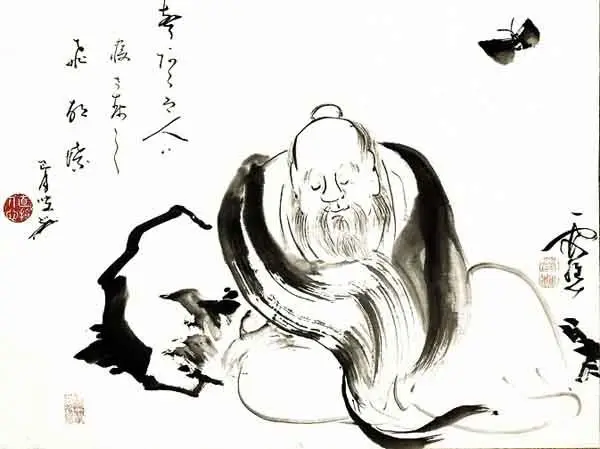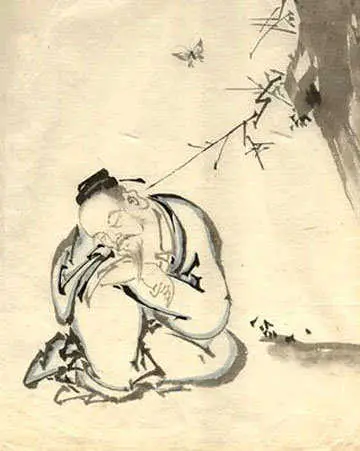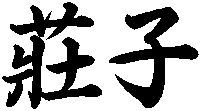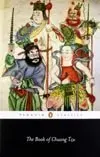|
Tao Te Ching
THE TAOISM OF LAO TZU
|
Chuang Tzu 4 The Taoist Text, Chapter 4
Man in the World, Associated with other Men.1. Yen Hui went to see Kung-nì, and asked leave to take his departure. "Where are you going to?" asked the Master. "I will go to Wei" was the reply. "And with what object?" "I have heard that the ruler of Wei is in the vigour of his years, and consults none but himself as to his course. He deals with his state as if it were a light matter, and has no perception of his errors. He thinks lightly of his people's dying; the dead are lying all over the country as if no smaller space could contain them; on the plains and about the marshes, they are as thick as heaps of fuel. The people know not where to turn to. I have heard you, Master, say, "Leave the state that is well governed; go to the state where disorder prevails." At the door of a physician there are many who are ill. I wish through what I have heard (from you) to think out some methods (of dealing with Wei), if peradventure the evils of the state may be cured."
Kung-nì said, "Alas! The risk is that you will go only to suffer in the punishment (of yourself)! The right method (in such a case) will not admit of any admixture. With such admixture, the one method will become many methods. Their multiplication will embarrass you. That embarrassment will make you anxious. However anxious you may be, you will not save (yourself). The perfect men of old first had (what they wanted to do) in themselves, and afterwards they found (the response to it) in others. If what they wanted in themselves was not fixed, what leisure had they to go and interfere with the proceedings of any tyrannous man? "Moreover, do you know how virtue is liable to be dissipated, and how wisdom proceeds to display itself? Virtue is dissipated in (the pursuit of) the name for it, and wisdom seeks to display itself in the striving with others. In the pursuit of the name men overthrow one another; wisdom becomes a weapon of contention. Both these things are instruments of evil, and should not be allowed to have free course in one's conduct. Supposing one's virtue to be great and his sincerity firm, if he do not comprehend the spirit of those (whom he wishes to influence); and supposing he is free from the disposition to strive for reputaiion, if he do not comprehend their minds;- when in such a case he forcibly insists on benevolence and righteousness, setting them forth in the strongest and most direct language, before the tyrant, then he, hating (his reprover's) possession of those excellences, will put him down as doing him injury. He who injures others is sure to be injured by them in return. You indeed will hardly escape being injured by the man (to whom you go)! "Further, if perchance he takes pleasure in men of worth and hates those of an opposite character, what is the use of your seeking to make yourself out to be different (from such men about him)? Before you have begun to announce (your views), he, as king and ruler, will take advantage of you, and immediately contend with you for victory. Your eyes will be dazed and full of perplexity; you will try to look pleased with him; you will frame your words with care; your demeanour will be conformed to his; you will confirm him in his views. In this way you will be adding fire to fire, and water to water, increasing, as we may express it, the evils (which you deplore). To these signs of deferring to him at the first there will be no end. You will be in danger, seeing he does not believe you, of making your words more strong, and you are sure to die at the hands of such a tyrant. "And formerly Kieh killed Kwan Lung-fang, and Kâu killed the prince Pì-kan. Both of these cultivated their persons, bending down in sympathy with the lower people to comfort them suffering (as they did) from their oppressors, and on their account opposing their superiors. On this account, because they so ordered their conduct, their rulers compassed their destruction:- such regard had they for their own fame. (Again), Yâo anciently attacked (the states of) Tshung-kih and Hsü-âo, and Yü attacked the ruler of Hû. Those states were left empty, and with no one to continue their population, the people being exterminated. They had engaged in war without ceasing; their craving for whatever they could get was insatiable. And this (ruler of Wei) is, like them, one who craves after fame and greater substance;- have you not heard it? Those sages were not able to overcome the thirst for fame and substance;- how much less will you be able to do so! Nevertheless you must have some ground (for the course which you wish to take); pray try and tell it to me." Yen Hui said, "May I go, doing so in uprightness and humility, using also every endeavour to be uniform (in my plans of operation)?" "No, indeed!" was the reply. "How can you do so? This man makes a display of being filled to overflowing (with virtue), and has great self-conceit. His feelings are not to be determined from his countenance. Ordinary men do not (venture to) oppose him, and he proceeds from the way in which he affects them to seek still more the satisfaction of his own mind. He may be described as unaffected by the (small lessons of) virtue brought to bear on him from day to day; and how much less will he be so by your great lessons? He will be obstinate, and refuse to be converted. He may outwardly agree with you, but inwardly there will be no self-condemnation;- how can you (go to him in this way and be successful)?" (Yen Hui) rejoined, "Well then; while inwardly maintaining my straightforward intention, I will outwardly seem to bend to him. I will deliver (my lessons), and substantiate them by appealing to antiquity. Inwardly maintaining my straightforward intention, I shall be a co-worker with Heaven. When I thus speak of being a co-worker with Heaven, it is because I know that (the sovereign, whom we style) the son of Heaven, and myself, are equally regarded by Heaven as Its sons. And should I then, as if my words were only my own, be seeking to find whether men approved of them, or disapproved of them? In this way men will pronounce me a (sincere and simple) boy. This is what is called being a co-worker with Heaven. "Outwardly bending (to the ruler), I shall be a co-worker with other men. To carry (the memorandum tablet to court), to kneel, and to bend the body reverentially:- these are the observances of ministers. They all employ them, and should I presume not to do so? Doing what other men do, they would have no occasion to blame me. This is what is called being a fellow-worker with other men. "Fully declaring my sentiments and substantiating them by appealing to antiquity, I shall be a co-worker with the ancients. Although the words in which I convey my lessons may really be condemnatory (of the ruler), they will be those of antiquity, and not my own. In this way, though straightforward, I shall be free from blame. This is what is called being a co-worker with antiquity. May I go to Wei in this way, and be successful?" "No indeed!" said Kung-nì. "How can you do so? You have too many plans of proceeding, and have not spied out (the ruler's character). Though you firmly adhere to your plans, you may be held free from transgression, but this will be all the result. How can you (in this way) produce the transformation (which you desire)? All this only shows (in you) the mind of a teacher!"
Kung-nì replied, "In all things under heaven there are two great cautionary considerations:- the one is the requirement implanted (in the nature); the other is the conviction of what is right. The love of a son for his parents is the implanted requirement, and can never be separated from his heart; the service of his ruler by a minister is what is right, and from its obligation there is no escaping anywhere between heaven and earth. These are what are called the great cautionary considerations. Therefore a son finds his rest in serving his parents without reference to or choice of place; and this is the height of filial duty. In the same way a subject finds his rest in serving his ruler, without reference to or choice of the business; and this is the fullest discharge of loyalty. When men are simply obeying (the dictates of) their hearts, the considerations of grief and joy are not readily set before them. They know that there is no alternative to their acting as they do, and rest in it as what is appointed; and this is the highest achievement of virtue. He who is in the position of a minister or of a son has indeed to do what he cannot but do. Occupied with the details of the business (in hand), and forgetful of his own person, what leisure has he to think of his pleasure in living or his dislike of death? You, my master, may well proceed on your mission. "But let me repeat to you what I have heard:- In all intercourse (between states), if they are near to each other, there should be mutual friendliness, verified by deeds; if they are far apart, there must be sincere adherence to truth in their messages. Those messages will be transmitted by internuncios. But to convey messages which express the complacence or the dissatisfaction of the two parties is the most difficult thing in the world. If they be those of mutual complacence, there is sure to be an overflow of expressions of satisfaction; if of mutual dissatisfaction, an overflow of expressions of dislike. But all extravagance leads to reckless language, and such language fails to command belief. When this distrust arises, woe to the internuncio! Hence the Rules for Speech say, "Transmit the message exactly as it stands; do not transmit it with any overflow of language; so is (the internuncio) likely to keep himself whole."
"Further still, let your mind find its enjoyment in the circumstances of your position; nourish the central course which you pursue, by a reference to your unavoidable obligations. This is the highest object for you to pursue; what else can you do to fulfil the charge (of your father and ruler). The best thing you can do is to be prepared to sacrifice your life; and this is the most difficult thing to do."
"Do you not know (the fate of) the praying mantis? It angrily stretches out its arms, to arrest the progress of the carriage, unconscious of its inability for such a task, but showing how much it thinks of its own powers. Be on your guard; be careful. If you cherish a boastful confidence in your own excellence, and place yourself in collision with him, you are likely to incur the fate (of the mantis). "Do you not know how those who keep tigers proceed? They do not dare to supply them with living creatures, because of the rage which their killing of them will excite. They do not (even) dare to give them their food whole, because of the rage which their rending of it will excite. They watch till their hunger is appeased, (dealing with them) from their knowledge of their natural ferocity. Tigers are different from men, but they fawn on those who feed them, and do so in accordance with their nature. When any of these are killed by them, it is because they have gone against that nature. "Those again who are fond of horses preserve their dung in baskets, and their urine in jars. If musquitoes and gadflies light on them, and the grooms brush them suddenly away, the horses break their bits, injure (the ornaments on) their heads, and smash those on their breasts. The more care that is taken of them, the more does their fondness (for their attendants) disappear. Ought not caution to be exercised (in the management of them)?"
When Mr. Shih was returning, the altar-oak appeared to him in a dream, and said, "What other tree will you compare with me? Will you compare me to one of your ornamental trees? There are hawthorns, pear-trees, orange-trees, pummelo-trees, gourds and other low fruit-bearing plants. When their fruits are ripe, they are knocked down from them, and thrown among the dirt. The large branches are broken, and the smaller are torn away. So it is that their productive ability makes their lives bitter to them; they do not complete their natural term of existence, but come to a premature end in the middle of their time, bringing on themselves the destructive treatment which they ordinarily receive. It is so with all things. I have sought to discover how it was that I was so useless;- I had long done so, till (the effort) nearly caused my death; and now I have learned it:- it has been of the greatest use to me. Suppose that I had possessed useful properties, should I have become of the great size that I am? And moreover you and I are both things;- how should one thing thus pass its judgment on another? how is it that you a useless man know all this about me a useless tree?" When Mr. Shih awoke, he kept thinking about his dream, but the workman said, "Being so taken with its uselessness, how is it that it yet acts here as the altar for the spirits of the land?" "Be still," was the master's reply, "and do not say a word. It simply happened to grow here; and thus those who do not know it do not speak ill of it as an evil thing. If it were not used as the altar, would it be in danger of being cut down? Moreover, the reason of its being preserved is different from that of the preservation of things generally; is not your explaining it from the sentiment which you have expressed wide of the mark?"
In Sung there is the district of King-shih, in which catalpae, cypresses, and mulberry trees grow well. Those of them which are a span or two or rather more in circumference are cut down by persons who want to make posts to which to tie their monkeys; those which are three or four spans round are cut down by persons who want beams forr their lofty and famous houses; and those of seven or eight spans are cut down by noblemen and rich merchants who want single planks for the sides of their coffins. The trees in consequence do not complete their natural term of life, and come to a premature end in the middle of their growth under the axe and bill;- this is the evil that befalls them from their supplying good timber. In the same way the Kieh (book) specifies oxen that have white foreheads, pigs that have turned-up snouts, and men that are suffering from piles, and forbids their being sacrificed to the Ho. The wizards know them by these peculiarities and consider them to be inauspicious, but spirit-like men consider them on this account to be very fortunate.
"The mountain by its trees weakens itself. The grease which ministers to the fire fries itself. The cinnamon tree can be eaten, and therefore it is cut down. The varnish tree is useful, and therefore incisions are made in it. All men know the advantage of being useful, but no one knows the advantage of being useless." 
Chuang Tzu
 The Book of Chuang TzuA modern translation of Chuang Tzu, by Martin Palmer and Elizabeth Breuilly.See the book at Amazon
About CookiesMy Other Websites:I Ching OnlineThe 64 hexagrams of the Chinese classic I Ching and what they mean in divination. Try it online for free.
Qi Energy ExercisesThe ancient Chinese life energy qi (chi) explained, with simple instructions on how to exercise it.
Life EnergyThe many ancient and modern life force beliefs all over the world explained and compared.
Taoismen på svenska
Other Books by Stefan StenuddClick the image to see the book at Amazon (paid link).
The Greek philosophers and what they thought about cosmology, myth, and the gods. |
 Tao Te Ching
Tao Te Ching Tao Quotes
Tao Quotes Fake Lao Tzu Quotes
Fake Lao Tzu Quotes Cosmos of the Ancients
Cosmos of the Ancients Qi — Increase Your Life Energy
Qi — Increase Your Life Energy Aikido Principles
Aikido Principles Life Energy Encyclopedia
Life Energy Encyclopedia Archetypes of Mythology
Archetypes of Mythology Stefan Stenudd
Stefan Stenudd